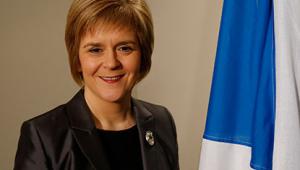The talks have stalled over the fiscal framework to accompany the 2016 Scotland Bill, the legislation that enacts the Smith Commission proposals to devolve a further tranche of tax and benefits powers to Scotland. The legislation originates in Westminster, but requires agreement from the Scottish Parliament to take effect.
Scottish ministers insist they are prepared to withhold Holyrood consent for the Bill and so walk away from the new powers it confers – including control over income tax, and retention of VAT revenues raised in Scotland by the UK – if there is no acceptable deal on a fiscal framework to replace the Barnett Formula for determining Scotland’s share of UK spending.
In a BBC interview this morning, first minister Nicola Sturgeon said: "I am simply asking for a fair deal and as first minister I wouldn't be doing my job properly, and I wouldn't be serving the people of Scotland well, if I signed up to a deal that over the next few years would strip billions of pounds out of the Scottish budget regardless of the decisions that the Scottish government took."
At issue are rival interpretations of the “no detriment” principle underpinning the Bill, as prescribed by the Smith Commission. This is intended to ensure that neither Scotland nor the UK would be disadvantaged by the reforms, assuming that their economies grew at the same rate and that they set taxes at the same levels.
The sticking point arises from a projected fall in Scottish population, proportionate to that of the rest of the UK. The Treasury has proposed alternative mechanisms known as “levels deduction” or “Indexed deduction,” while Scottish ministers want a per capita formula that would effectively discount the effects of relative population decline in Scotland.
Their stance won support yesterday from a top Scottish economist, Professor Anton Muscatelli, the principal of Glasgow University. Writing in the Herald newspaper, Muscatelli suggested that the Treasury formulae could short-change the Scottish public finances by £7bn or £3.5bn respectively over a decade.
“The fiscal framework is as important as the content of the Scotland Bill itself,” Muscatelli wrote. “A poorly designed package would pose an unacceptable risk to the Scottish government and Scottish public services.”
The clock, meanwhile, is ticking. John Swinney is adamant that a deal must be reached by February 12 in order for there to be time for the legislation to complete its passage in both parliaments ahead of the Holyrood elections on May 5.
Swinney faces a further deadline on Tuesday, as this is the date he has set for Scotland’s 32 local authorities to accept or reject his 2016/17 financial support package and a further year of the council tax freeze. This year’s negotiations have descended into unprecedented acrimony, with the Convention of Scottish Local Authorities, which represents most councils, last week voting to reject the offer.
Despite that vote, the signs are that most – if not all – councils will accept the package with ill grace, since the cost of opting out would see them sacrifice central government compensation for the council tax freeze, money to pay for retaining teacher numbers at present levels, and funds to underpin the merging of health and social care provision.




















